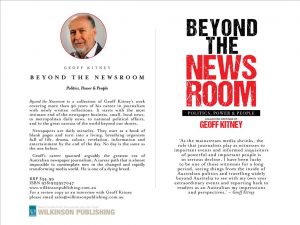The Government’s “Up yours Delors” bravado could cost the United Kingdom dearly, writes Geoff Kitney.
All that glitters is not necessarily gold. UK Trade Minister Liz Truss might have been well advised to keep this old truism in mind when she used it, just before her promotion to the more exalted position of Foreign Secretary in Boris Johnson’s recent ministerial reshuffle.
Truss was enthusing about the “exciting” prospect of the UK being considered for admission to the world’s biggest “free trade” club – the Pacific partnership.
For the UK to be admitted, she swooned, would be the “glittering prize” for new “global, post-Brexit” Britain.
Now, viewed from the other end of the world, with the Pacific Ocean lapping at our shores, this seemed a rather odd, slightly Alice in Wonderland point of view.
What sort of logic does it take to see membership of a trade club on the opposite side of the globe as a “glittering prize” compared to the membership Britain had of a vast single market to which it already had privileged access on its doorstep?
Especially when you hear trade policy experts point out that, to accept the terms of becoming a member of the Pacific trade club, Britain would be required to make many of the sovereignty compromises that it considered unacceptable as members of the European Union and, the rejection of which, was a fundamental reason Britain decided to quit the Union.
Taking back control by leaving the EU would mean giving up control to gain admission to the Pacific trade club.
The Pacific free trade bloc – or to give it its cumbersome formal name, the Comprehensive and Progressive Agreement for Trans-Pacific Partnership – is comprised of 11 members, all of them with Pacific Ocean borders. Its closest member to the UK is 10,000 kilometres away.
Former Australian trade negotiator and now UK-based commentator on trade issues, Dimitri Grozoubinski, has warned that it is highly unlikely that membership of the Pacific trade club would make any significant difference to the UK’s post-Brexit economic prospects.
As far as this writer can tell, no-one with serious trade policy credentials sees much to be gained from the UK signing up to the CPTPP. I can find no-one who sees Liz Truss’s “glittering prize”.
This is how New Zealand TV is reporting the Brexit trade deal with the UK
— Alex Taylor (@AlexTaylorNews) October 24, 2021
They visibly can't believe their luck that British farming has been made the "sacrificial lamb" for a deal hugely beneficial to NZ with "negligeable benefits for UK farmers who get nothing in return" 👇 pic.twitter.com/Qrj8Xhixpz
The consensus of opinion is that the UK has settled on the CPTPP as its next best option after what now seems to be an out-of-reach trade deal with the United States.
When he cheered on the UK’s Brexit push, then US President Donald Trump held out the carrot of a USA-UK free trade deal. Brexiters argued that, in effect: “Who needs the EU when we have a US deal within easy reach”.
It’s actually highly doubtful that the UK would have got any inside running on a US-UK FTA. Despite Trump’s rhetoric, there would have been huge hurdles to overcome for US business to accept such a deal.
With Brexit completed and Trump gone, the centre-piece of the Johnson government’s plan for the creation of Global Britain, at the vanguard of a new era of open global trade, has come to almost nothing.
The most significant step forward has been an in-principle trade agreement with Australia, but negotiations to complete the deal are taking longer than predicted and the ultimate benefits of a completed deal are now forecast to be minimal. A similar deal has been done with New Zealand, although this seems even less beneficial to the UK.
The UK has been reduced to attempting to find a backdoor means of gaining access to the US market by sounding out the possibility of joining USMCA – a trade zone encompassing the US, Mexico and Canada – but this agreement has no accession provisions. This means the members have no intention of expanding its membership.
The consensus of opinion is that the UK has settled on the CPTPP as its next best option after what now seems to be an out-of-reach trade deal with the United States.
At least the trans-Pacific trade agreement has accession provisions – although it no longer offers a back-door means of gaining access to the US market. One of the first actions of Donald Trump after he became President was to withdraw the US from the pact. US political observers see little chance that the US under President Joe Biden will try to take the US back into the pact.
Whether the UK eventually is accepted by the 11 members of the trans-Pacific trade club won’t be known for a while and, anyway, the members have a much bigger player knocking at its door – China.
Although it was never explicitly stated, the original purpose of the bloc was to counter China’s growing economic power and strategic influence in the Asia-Pacific region. When the US decided it would sign up to membership of the bloc, then President Barack Obama declared that the US intended to “pivot” its global strategic focus from Europe to Asia.
When Trump unceremoniously pulled the US out of the bloc it was seen as the US retreating from its world leadership role, amid warnings that China would seek to fill the void.
That is exactly what is now happening in the Asia-Pacific region and China’s application to join the Pacific trade pact will pose its members an excruciating choice about the further expansion of the membership of the pact.
This has relevance for the dynamics of the current conflict between the UK and the EU over the Irish border.
If Boris Johnson has in the back of his mind that a complete breakdown of relations with the EU, leading to a trade war, might not matter so much if the UK is permitted to join the trans-Pacific trade pact, there are some big questions that he needs to answer.
Taking back control by leaving the EU would mean giving up control to gain admission to the Pacific trade club.
As the UK hardens its approach to dealing with China, as evidenced by its decision to be involved in the new anti-China AUKUS pact, where would it stand on the idea of China’s accession to the Pacific trade pact?
Or, if the existing pact members decide to refuse China admission and this escalates into a deeper strategic stand-off in the Pacific, how deeply would the UK want to be drawn into such a conflict.
But even before questions like these need to be answered there is a more urgent one, linked to the UK-EU tensions over the Irish border.
If the UK, at Johnson’s direction, decides to go rogue and act unilaterally to dump the border agreement, such a move would be sure to cause deep consternation with any future potential partners in a trade agreement with the UK.
As Dimitri Grozoubinski put it in a Twitter post recently: “The reason you try to abide by international law, whenever possible, isn’t that it’s sacred or powerfully enforced. It’s because you don’t want to send other countries, who also have messy domestic politics, the message their commitments are also optional. A child can grasp this”.
But can a “man-child”?
The Brexit crowd cheering Boris Johnson’s every Trump-like insult to the EU – and hoping for a final “up yours Delors” moment in relation to the Irish border – need to be aware that the rest of the world is watching this bit of British brinkmanship.
The UK’s future as a trading nation will depend on the degree to which other non-EU nations are willing to trust the UK to honour the terms of such deals.
“Glittering prizes” in the form of deals which replace the huge benefits that the UK enjoyed – and turned its back on – as a member of the European Union might turn out to be much harder, and maybe even impossible, to win.
Headline image credit: Octus_Photography/Shutterstock.com






